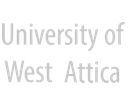QUALITATIVE MICROBIOLOGICAL RISK ASSESSMENT FOR WASTEWATER REUSE FOR IRRIGATION IN GREECE
Abstract
Wastewater irrigation poses several threats to the environment via contamination by nutrients, heavy metals, and salts. Increased loads of nitrates in wastewater may increase the risk of groundwater contamination. Qualitative risk assessment consists of a descriptive process which is closely related to the quantitative calculation of risk. Qualitative assessment is used for an initial control and management of the hazards. All the fundamental principles of quantitative risk assessment are applied for this purpose. Critical points include, hazard identification, critical points justification, the description of important steps and collection of data including data related to uncertainty and variance. In this study data collected from three Greek Sewage Treatment Plants were used and the assessed parameters were bacterial indicators (Total coliforms and E.coli) bacteriophages and viruses
Keywords
sewage, treatment plants, risk assessment, public health, irrigation
DOI: 10.26265/e-jst.v10i2.714
Refbacks
- There are currently no refbacks.






